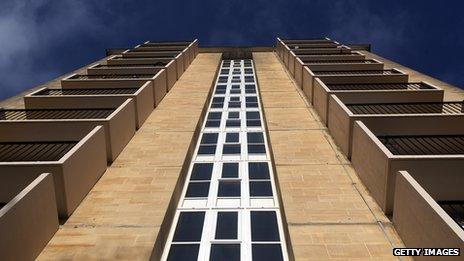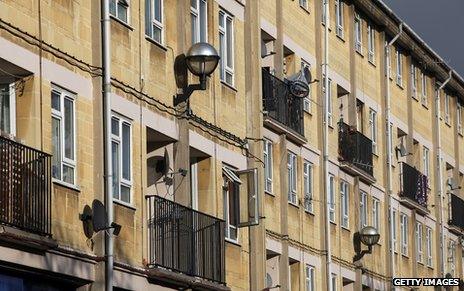Welfare reform and not paying the rent
- Published
- comments

Government plans to change the way social housing tenants pay their rent, could have serious consequences for some of the poorest people in Britain - and their landlords. So why are they being kept secret from the public?
Government ministers talk a lot about the importance of transparency and openness in the way the state operates. So it is surprising and disappointing that on an issue that affects the lives of hundreds of thousands of the poorest and most vulnerable people in Britain they are being so secretive.
I am talking about the plans to force social housing tenants to pay their own rent rather than housing benefit going straight to landlords - a key part of the government's flagship welfare reforms.
The changes are due to come in next year, with all benefits rolled into one universal credit (UC) paid directly to the recipient. The government wants claimants to take responsibility for their budgets.
But the proposals are proving far from easy to introduce. Since July, the Department of Work and Pensions has been testing the changes in six areas. These pilots (described as "demonstration projects" by the DWP) are shrouded in secrecy.
Participants have had to promise not to reveal any of the results without express departmental approval. A website which aims to identify potential "issues" with the reforms - the Housing Benefit Direct Payments Network - is only accessible to people vetted by Whitehall. Journalists are not welcome.
However, I have managed to gain access to the secret site and it seems clear that the government has seriously underestimated the challenge of getting claimants to start paying their monthly rent.
Even people deemed at low risk of failing to pay their rent on time are "not managing as expected", the site reveals. Many social tenants have little or no experience of monthly budgets. They get their benefit in cash each week, and while they are often highly adept at managing to operate on a low income over seven days, they may not have a bank account or access to the internet.
I was given an insight to the challenge recently when a landlord explained how a single mum in a social-rented block was asked if she would like to give up the coin-in-the-slot electricity meter and pay for her power monthly through the housing association.
She explained that she wouldn't because, when things got really tight, she knew she could do one less wash a week and cut down on the heating to save the pound coins going into the meter. It was her way of keeping control of her budget.
The department is now committed to reviewing the support available to tenants. A slide show by the DWP manager of the demonstration projects, Vince Hughes, says "there have been surprises" in the way housing benefit claimants have coped with paying rent themselves.
"We need to review the support assessment matrix," he says.
The key question for landlords is whether they will be able to collect the rent. Many housing providers have borrowed money against a promise that they'll get 98% or more of what they are owed each month. Business plans are reliant on arrears of less than 2%.
When I asked the DWP what sort of rent collection figures the pilots had identified I was told the projects were "not about arrears but learning lessons".
Well, if the rumours are right, the lesson to be learned is that about 20-30% of tenants may well struggle to pay the rent on time when UC comes in. Such an outcome is a massive headache, not just for the housing providers and social landlords, but for the whole welfare reform project.

The DWP recognises that a minority of housing benefit recipients may never be able to manage their finances and there is a system for some tenants to have their housing benefit extracted from UC and paid directly to the landlord in the traditional way.
But the government doesn't want this to be more than about 10% of the total - very much the exception rather than the rule. There will obviously be additional cost and complexity in such a measure and the whole welfare reform package is built upon simplicity and cost-saving.
The DWP is to introduce a system called "switchback" where tenants whose arrears reach a certain level will have their housing benefit paid directly to the landlord while they receive support for organising their finances. As soon as the arrears are paid off, they supposedly go back on the UC scheme.
The trouble is that this idea poses as many questions as answers. How many weeks of arrears would be the trigger for switchback? Too few and it will capture large numbers of tenants; too many and the debts will be much harder to pay off.
How will the IT system cope with people moving on and off the main UC system? There are already concerns that the IT database is not going to be able to cope with the complexity required.
How will landlords survive if their income stream is disrupted by the welfare changes? I understand some housing providers are already reining back on home improvement and maintenance programmes to create a financial cushion. Others may go under.
It is for these reasons that the DWP select committee is warning ministers not to rush into the programme.
"We believe that time needs to be allowed for a proper evaluation of the pilots which the Government is running on direct payments to tenants, followed by a phased implementation of direct payments, after appropriate safety net arrangements for vulnerable people have been developed and tested."
The committee says it is necessary to establish a robust process for identifying claimants who are struggling so they can be helped before they fall into arrears and face eviction.
The question of how some of Britain's poorest people are going to cope with welfare reform is an important one. It is critical there is informed public debate about the challenges and risks.
Rather than refusing to publish details of the publicly-funded pilots, there must be merit in talking about this now. The first tenants will be receiving their housing benefit in UC payments within a few months. It will be to nobody's advantage if we see very vulnerable people fall into extreme debt, being evicted and left homeless.
Update 10:12 GMT on 24 November
Since posting this story, a spokesman for the DWP has called to say that the non-collection rates on the pilots are not as high as suggested.
While not giving me the actual figures, the department says one of the demonstration projects had a rate "in the teens" rather than 20-30%. As soon as I have official data, I will publish it here.